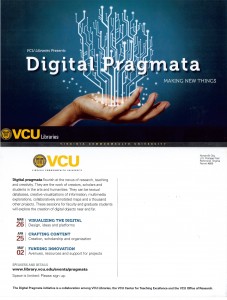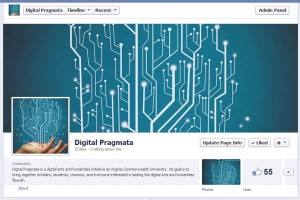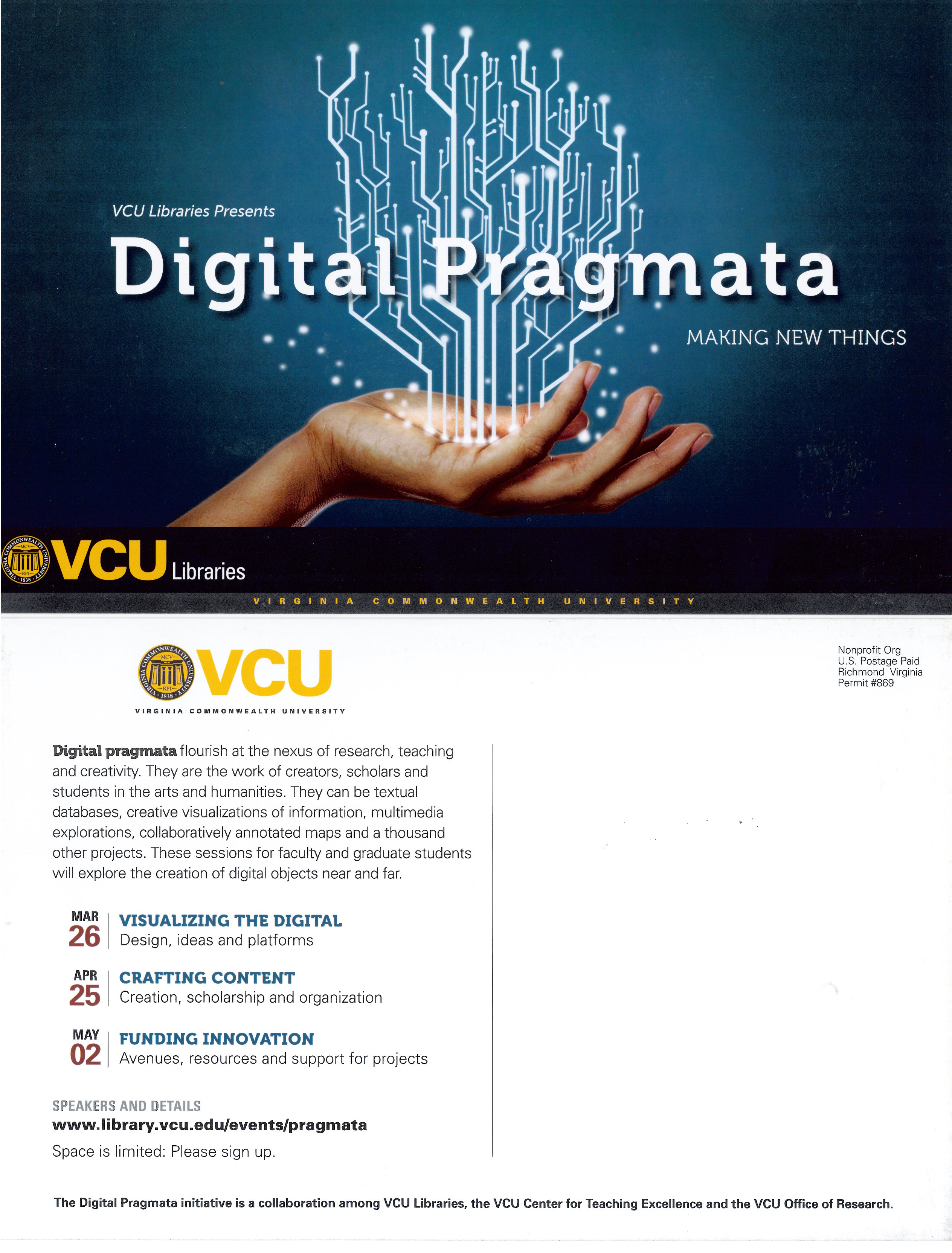How did Virginia Commonwealth University librarians John Glover, Humanities Research Librarian, and Kristina Keogh, formerly the Visual Arts Research Librarian, build a DH initiative from the ground up? In this post, they detail their process for dreaming up, planning, developing, deploying, and evaluating Digital Pragmata over the course of its first year.
Impetus
ALA Annual in 2012 featured the first meeting of the ACRL Digital Humanities Discussion Group and a preconference entitled “Digital Humanities in Theory and Practice: Tools and Methods for Librarians.” The former contributed to the creation of dh+lib, and the general interest in both demonstrated the demand for things DH-related within ALA. They also inspired the two of us to create Digital Pragmata, an ongoing digital arts and humanities initiative at Virginia Commonwealth University, based primarily at VCU Libraries, which kicked off with an event series. We did this within an academic year, without a formal structure to accommodate the work, no local past initiatives to draw on as examples, and minimal visible on-campus DA/DH community. Digital Pragmata has grown VCU Libraries’ DH profile on campus, reached hundreds of VCU faculty and students interested in digital scholarship, and paved the way for us to offer new kinds of outreach and support.
First Steps
Early in July of 2012, the two of us met to review our recent liaison activities and plans for the coming academic year. Not for the first time, we noted that we were continuing to encounter faculty and graduate students at VCU interested in the digital arts or digital humanities, whether in scholarly, pedagogical, or creative capacities, many of whom weren’t prepared to “do” DH, and who seemed to be looking for community.
Multiple developments relevant to the digital arts and humanities are moving forward at VCU, but no unit on campus is currently devoted solely to the digital arts or humanities. This is somewhat surprising, as Virginia Commonwealth University is a large urban research institution, with an FTE around 31,752 and various departments, programs, and interdisciplinary centers working in these areas–including top-ranking arts programs. On the other hand, as is often observed, libraries occupy a neutral ground, and finding the right blend of people, place, and resources takes time.
Based on what John had learned at ALA in Anaheim, he broached the subject of collaborating to create a digital arts and humanities initiative based out of VCU Libraries, and Kristina enthusiastically agreed. After a brief discussion, we decided that we wanted a real shot at creating something sustainable that would dovetail with library and university strategic goals: not just a workshop, lecture, or online presence, but a combination of all three, with growth potential. We decided provisionally, at John’s suggestion, to name it “Digital Pragmata,” reflecting the drive toward usefulness at the core of “more hack, less yack,” as well as the general concept of “digital things.”
Our interest in the project was strong, but we faced various potential hurdles. In our time at VCU, no liaison librarians had run, let alone started, a project on the scale we planned. Initiatives from our division, Public Services (since renamed “Research and Learning”), had not by and large previously been characterized by agile project management. We didn’t know how many people we would have to convince or collaborate with, or whom to seek out as partners. We had never attempted a project requiring substantial financial support from our library’s leadership. Perhaps our biggest hurdle was overcoming our own preconceived notions, both of what constituted feasible projects for librarians at our level and what kind of support we could expect from our institution.
The Landscape
As part of our initial planning process, we studied other institutions’ approaches. We learned, for instance, that the Institute for Advanced Study at the University of Minnesota has established Digital Humanities 2.0, a collaborative working group “to investigate and create ways of advancing artistic creation and scholarly research in the humanities by exploring digitization and Web 2.0 technologies.” We also looked at SUNY Buffalo’s Humanities Institute (HI) Research Workshops, which sponsors guest lectures and hosts presentations of research in progress by faculty and graduate students from diverse disciplines.
We were particularly interested in initiatives based out of university libraries. A good model is the Digital Arts & Humanities Lecture Series developed and hosted by the Brown University Library and the John Nicholas Brown Center for Public Humanities and Cultural Heritage. This series closely aligned with our own goals of bringing together faculty and students from different disciplines engaged in digital projects.
We also looked at developing projects in the digital humanities at VCU. Though there are a growing number of DH projects based in various departments, at our institution there has been no one central place or structure where scholars and students that work on digital arts and humanities projects can come together. VCU has, however, been working toward a number of initiatives that would offer the possibility of likely partnerships if we were to successfully establish a DH initiative. These include the Institute for Contemporary Art (ICA) and the Center for Advanced Research in the Humanities, which is currently recruiting for a Director. In addition, at the time, VCU Libraries was in the process of recruiting a Head for the newly conceived Innovative Media Studio, which will become part of the new addition to the James Branch Cabell Library set to open in Fall 2015. In the meantime, the continuing lack of one (or any) zone of interaction for those interested in this type of activity was becoming an increasing issue.
Stakeholders and Speakers
While we were waiting for final approval from the Libraries’ Administration, we set up meetings with people and groups inside and outside the library in order to begin laying our groundwork. We knew there would be many moving parts, but getting buy-in on campus was important. Our first meetings were with two targeted units outside the library – the Office of Research and the Center for Teaching Excellence (CTE). By bringing these units on board as named co-sponsors, we knew we could – from the start – increase our network of contacts. Their connections would also offer another venue for promotion.
After we received final approval, we met with stakeholders inside the library, including other research and collections librarians and department heads from Special Collections & Archives to discuss Digital Pragmata. Our colleagues offered many suggestions for potential speakers and knowledge of relevant projects around the country. Our web presence would not have been possible without the work of Erin White and Joey Figaro, members of the web team from our Digital Technologies department. Finally, we contacted and met with likely faculty and department heads around campus to publicize the events and our reasons for starting the initiative.
The speakers developed from a list we populated, as well as suggestions from others we spoke with during this initial process. We received one piece of advice that shifted our initial thinking about our first two panel sessions. It was suggested that outside speakers (i.e. non-VCU people) were more likely to elicit interest from faculty and students as we worked to establish Digital Pragmata. We decided to refocus our two panels to feature outside speakers, with VCU faculty acting as moderators for each event. Based on the initial advice, we felt this would garner interest in the concept, so that we could focus more on VCU projects down the road.
In the third week of December, we met with our supervisor, Bettina Peacemaker, and the Associate University Librarian for Public Services, Dennis Clark, to discuss Digital Pragmata. Administrative Council had met, discussed, and endorsed our proposal for two panels and a digital projects funding workshop, all of which would be designed to appeal to faculty and graduate students across the range of arts and humanities disciplines. We were given the go-ahead to begin planning in earnest, empowered to work with those colleagues we thought could contribute time or expertise, with the knowledge that we had financial support to make the event a success.
There was to be no task force, working group, or standing committee. In addition to this vote of confidence, we were simply asked to check in when we had questions or there were developments (e.g. speakers confirmed). This was simultaneously liberating and nerve-wracking: we had been entrusted with a high-profile project, the success or failure of which could affect the library and its perception on campus, students and faculty in our disciplines, and our own work life and careers.
Into the Weeds

Our initial proposed budget was $600-$800. This, we argued, would be satisfactory to pay for light refreshments as well as travel, parking, and lunch to bring one speaker to each event from outside the Richmond metropolitan area. As our proposal’s parameters expanded, however, we were lucky to be approved for a much larger and more flexible budget, allowing us to offer honoraria for six outside speakers, travel and hotel accommodation for our out-of-town speakers, lunches for the speakers and university and library administration, receptions following two events, and gift bags for our speakers and moderators. Our process was heavily influenced by Gregory Kimbrell, VCU Libraries’ Membership and Events Coordinator, who both guided us and did or oversaw much of the events coordination work himself.
We spent a substantial amount of time trying to determine how best to publicize Digital Pragmata. One of the most important meetings in January was with our Director of Communication and Public Relations, Sue Robinson, with whom we discussed our overall publicity strategy and online presence. She helped us to think more effectively about our message and audience, and to target our promotion.

Sue, in turn, worked with a graphic designer on design concepts, one of which eventually led to the image that currently illustrates print materials like posters and mailers, and is the header image for Digital Pragmata’s blog, Facebook page, and Twitter feed (hashtag #digprag). Throughout the spring, colleagues, students, and faculty spoke effusively about the image’s eye-catching nature.
Showtime, and After
The March 26 and April 25 events each unfolded in similar fashion, on similar schedules. Library facilities and events colleagues ensured that our location, a multipurpose room seating around 65 people, was clean, with chairs set. Colleagues in library systems helped ensure that our technology was ready, and (see below) were indispensable when a travel debacle prevented one panelist from presenting in person. Colleagues from library events and administration helped to direct traffic, check attendees in, and keep everything running smoothly.
Our first panel, on March 26, had 49 attendees and focused on the “front ends” of digital projects, with speakers including Ed Ayers of the University of Richmond, Amanda French of the Roy Rosenzweig Center for History and New Media, and Emily Smith of 1708 Gallery. Each represented very different aspects of “front ends,” including Ed’s award-winning work creating many high-profile DH projects over the years, Amanda’s introduction to tools for DH newcomers, and Emily’s experience with large-scale art projects involving image projection. The panel began with comments from multiple people, starting with John Ulmschneider, VCU’s University Librarian, and it ended with a Q&A session led by moderator Roy McKelvey, of VCU’s Department of Graphic Design.
Our second panel, on April 25, had 54 attendees and focused on the “back ends” of digital projects, with speakers including Ben Fino-Radin of Rhizome and MoMA, Francesca Fiorani of the University of Virginia, and Mike Poston of the Folger Shakespeare Library. These speakers took different approaches to the topic, including Ben’s work recreating and emulating defunct BBSes, Francesca’s process in building Leonardo and His Treatise on Painting, and Mike’s hands-on experience creating Folger Digital Texts. The panel began with comments from several people, starting with Dennis Clark, our administrator and advocate, and it ended with a Q&A session led by moderator Joshua Eckhardt, of VCU’s Department of English.
The funding workshop, held on May 2, had 20 attendees and ran somewhat differently. We chose not to film it, so that attendees might feel more free to speak about their own projects, though this wound up not being the case. Our presenters were Jessica Venable, from VCU’s Office of Research, and David Holland, from VCU’s School of the Arts, each of whom have expertise in grantsmanship and funding. Attendance for this workshop was lower than the panels, which was initially somewhat disappointing, but at twenty people, it was a tremendous turnout compared to most other VCU Libraries open workshops, particularly as it occurred during final exams.
Stumbles, Challenges, and Surprises
The main problems we experienced were those associated with the planning and execution of almost any event. These include issues such as when during the semester, day of the week, and time of day to schedule programming to allow for maximum attendance. Similarly, finding rooms on campus large enough to hold as many attendees as possible, without being too large for the number that do show up, proved a challenge. We also grappled with travel issues for our speakers, specifically a canceled flight that made it necessary for one of our panelists to present virtually from the Philadelphia International Airport.
Perhaps more unique to this type of endeavor were the problems we faced with audience expectations. If your proposed DH initiative is something completely new, the audience may be happy with almost any level or type of programming provided, having no real expectations. Later on, as our post-event surveys revealed, our audience attended with some expectations about the nature of the programming.

Different people want different things or all things – including lectures, conversational and networking events, and active learning opportunities. There was also some tension between an interest in the opportunity to learn something potentially new and innovative from outside speakers and an interest in (and even a demand for) Digital Pragmata’s role and perceived mandate to highlight VCU projects.
Various other results were unexpected. Many attendees were attracted to the topic of “digital scholarship” and “digital objects,” but came from departments outside the arts or humanities. Likewise, while we expected a positive response overall based on early conversations with stakeholders, only one survey respondent felt that the panel they attended did not meet their expectations. It was a pleasure to succeed, by and large, but the margin by which we passed expectations and the level of intensity of interest across the university was remarkable.
The Road Ahead
Attendees’ response to Digital Pragmata was overwhelmingly positive, and the year ended with the initiative counted a success by stakeholders inside and outside of the library. Survey comments heavily influenced our plans for 2013-2014, which gradually took shape over the summer. Upcoming programming will feature a blend of events, from a brown bag series to multiple large events, at and beyond the scale of Spring 2013.
The complexion of the project has changed with Kristina’s move from VCU Libraries to Indiana University, where she is Head of their Fine Arts Library, though she retains an interest in and hopes to continue to contribute to Digital Pragmata. John is now working with new partners at VCU Libraries, both to enlarge the initiative’s base of expertise and to accommodate a more ambitious schedule of programming for the new year. The project was time-consuming and sometimes exhausting, but it allowed us to engage with hundreds of faculty and students in the arts and humanities, as well as the broader VCU and local communities, teaching us about events planning, programming, publicity, outreach, and more about the digital arts and humanities in the process.
[wp_biographia user=”jglover”]
[wp_biographia user=”keoghkm”]

